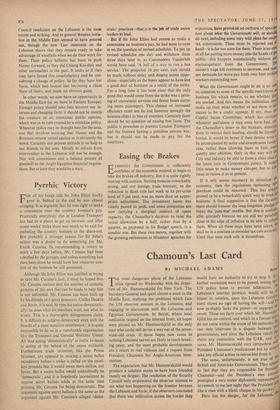Easing the Brakes
VIDENTLY the Government is sufficiently E, confident of the economic outlook to begin to take the brakes off industry. But it is quite rightly moving with caution. Sterling remains remarkably strong, and our foreign trade buoyant, so the reduction in Bank rate last week to its pre-crisis level of 5 per cent. was no more than an appro- priate adjustment. The investment boom has clearly passed its peak, and some companies are now carrying a marginal amount of spare capacity; the Chancellor's decision to raise the initial allowance by a half, rather than by a quarter, as proposed in his Budget speech, is a sensible one. But these two moves, together with the growing enthusiasm in Ministers' speeches for expansion, hive provoked an outburst of specul tion about what the Government will, or should do next, including some very wild pleas for mai tax concessions. These must be rejected out d hand—it is far too soon for them. There is no case at all for putting more money into the hands of tht public—this happens automatically without and encouragement from the Government. The nation's wage bill continues to increase, and the are demands for more pay from over four milling workers outstanding now.
What the Government ought to do is to tore its attention to some of the specific restrictions 00 business life which remain, to see whether the,' are needed. And this means the authorities muse make up their mind whether or not there is still meant to be a credit squeeze. If not, then the Capital Issues Committee, which has outlived whatever usefulness it may once have had, and the Chancellor's letter to the bankers, directing them to restrict their lending, should be formally buried. It would be better if their demise were l° be accompanied by noisy and conspicuous funeral rites, rather than allowing them to fade awe, quietly into oblivion. Only in this way will the City and industry be able to form a clear idea ni the latest turn in Government policy. It makes little sense to make money cheaper, but to COtv tinue to ration it as at present. • If it still seems necessary to stimulate the economy, then the regulations restricting hire purchase could be removed. This has alWaY5 proved to be a remarkably quick way to liven 14 business. A final suggestion is that the Govern' ment should •honour the long-forgotten pledge lei repay the 'post-war' credits. But this is unthinl." able, precisely because we are still too painfully close to the edge of inflation to be able to refile them. When all these steps have been taken, vie shall be in a position to consider tax cuts seriously' Until that time such talk is moonshine.


































 Previous page
Previous page